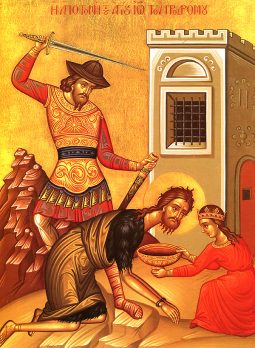The Beheading of the Glorious Prophet, Forerunner, and Baptist John is commemorated today, August 29, by the Orthodox Church.
The Prophets of the Old Testament, and the Forerunner of Christ, Saint John, lived, according to the Evangelist Mark, in the desert of Judea, proclaiming the coming of the Messiah and calling the people to repentance.
His speech was both comforting and reprimanding, like that of the older prophets, and he scolded sin and every kind of injustice. He did not hesitate to reprimand the Pharisees, both for their hypocrisy and for moral wrongdoings, as well as King Herod Antipas himself, who had an unlawful relationship with his brother’s wife, Herodias.
Due to this particular attitude, Saint John the Baptist was first imprisoned and was then beheaded, as Salomis, daughter of Herodias, had demanded. Salomis charmed the king with her dancing at his birthday party and he promised to give her anything she desired, up to half of his kingdom.
However, the wickedness and hatred of her mother prompted her, instead of another valuable gift, to ask for the head of John the Baptist. Even thought he was appalled by this request, Herod reluctantly agreed to executes the decision, according to the wish expressed by the mother and daughter.
John’s Precious Head, offered to Salome on a platter, was buried by the soldiers in the prison.
The Baptist of the Lord followed the path, according to the divine economy of God, and became the Forerunner of Christ.
As we honor St. John the Baptist today, let us imitate his ethos and outspokenness and, through the behavior of Herod, let us learn the consequences of self-indulgence and immorality, but also of the superficial behavior, which leads even to fools and arrogant vows.
The parsimony imposed by the modern way of life or the recurrent pandemics in our society can become an opportunity for spiritual exploration and transformation of arrogance and various human waste into simplicity, solidarity and charity.
Source: Church of Cyprus
